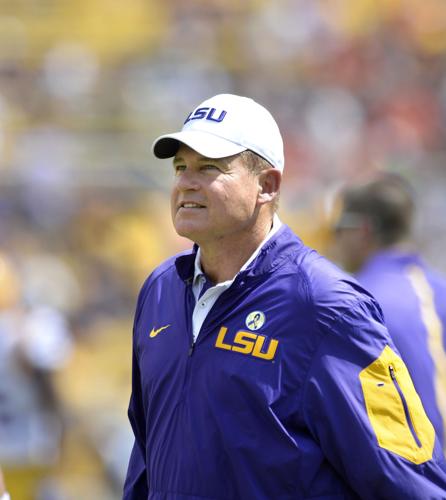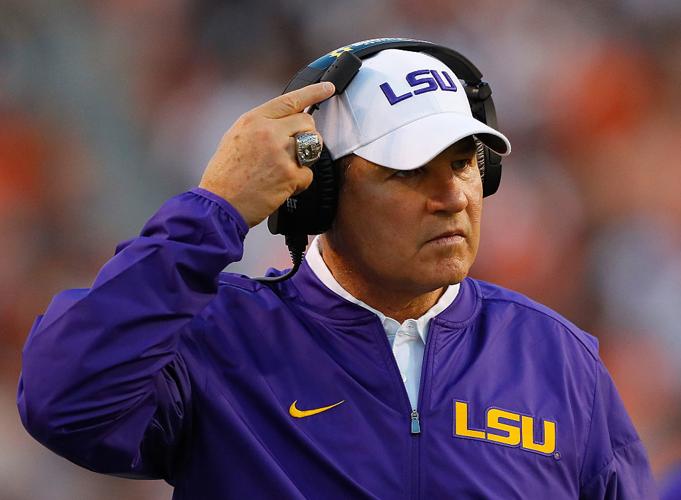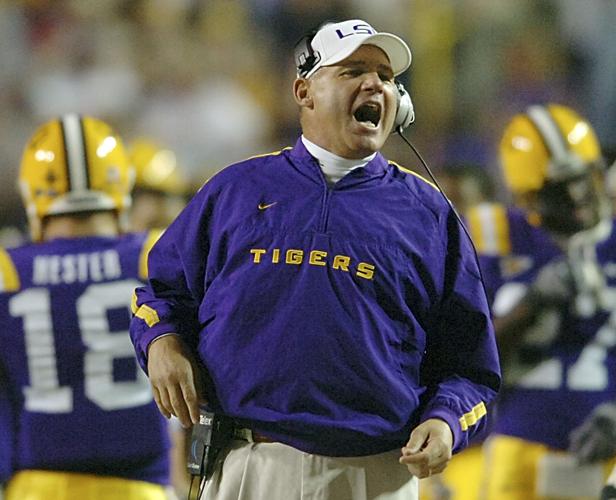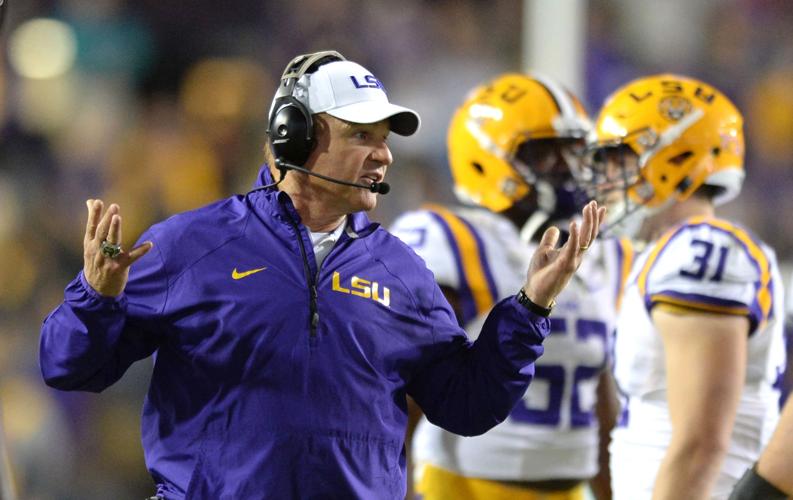Former LSU head football coach Les Miles reached a settlement with a former student who accused him of harassment several years ago, and the settlement has surfaced as investigators probe the university’s handling of sexual misconduct and domestic violence complaints, multiple sources with direct knowledge of the situation have confirmed to The Advocate | The Times-Picayune.
The episode goes back about a decade, when a former LSU Athletic Department student intern accused Miles of “hitting on her,” three of the sources said.
“As part of the Husch Blackwell review and our internal investigations, we have heard about a settlement, but LSU is not a party to it and we have not seen it,” Jim Sabourin, the university's vice president of strategic communications, said when presented with the allegations Wednesday. Husch Blackwell is the law firm LSU hired to scrutinize the university's handling of sexual misconduct and other complaints.
Reached by phone Wednesday, Miles, now the coach at the University of Kansas, denied he made advances toward a student intern. “That’s not true,” he said.
Miles was also the target of a 2013 sexual harassment investigation that LSU commissioned from law firm Taylor Porter, which delved into allegations that he sexually harassed student workers and made sexist comments about others, USA Today reported Wednesday. The newspaper said its reporters interviewed three people familiar with the sexual harassment investigation; those people told them that the review determined Miles’ actions were improper but did not lead to any disciplinary action.
Miles, who was married at the time and still is, did not directly address questions about the settlement posed by The Advocate. A longtime attorney for Miles, New York-based Peter Ginsberg, said in an email Wednesday that a description of Miles’ settlement with the student was “discernibly incomplete and inaccurate, and its publication would recklessly cast Mr. Miles in a false light.” Ginsberg did not respond to follow-up questions about whether he was denying the existence of the settlement itself.
The long-buried settlement — which does not turn up in searches of Baton Rouge court records — has come to light amid a larger review of how LSU has handled allegations of sexual misconduct and domestic violence cases, the sources said. Husch Blackwell is expected to deliver a report late next week that examines how LSU has handled a number of cases, including allegations of sexual assault and domestic violence involving LSU football players. Some of those incidents happened under Miles’ tenure, and others occurred after current coach Ed Orgeron took over in 2016.
As a new report shines light on LSU's failures to investigate allegations of sexual misconduct and Title IX violations, The Advocate | Times-P…
It’s unclear how prominently the Miles allegations may figure into Husch Blackwell's report, but the settlement appears to have preceded the larger Taylor Porter review eight years ago of how Miles treated female students at the university.
Miles has intervened in a case in Baton Rouge district court in an effort to prevent LSU from releasing the law firm’s investigation.
Records show that USA Today — which in November broke the initial story that prompted the Husch Blackwell investigation — filed a lawsuit against LSU last month. That was about a month after a reporter for the newspaper filed a public records request with the university seeking an “investigation report by the law firm Taylor Porter into former LSU football coach Les Miles.”
Taylor Porter continues to represent LSU in a wide range of legal matters, including another recent public records lawsuit involving police reports naming former LSU football star Derrius Guice.
LSU is under investigation by the U.S. Department of Education over how the university reports and investigates crimes on campus, a probe open…
LSU’s attorneys refused to release the Taylor Porter report, saying that doing so would deprive Miles of his constitutional right to privacy. They cited the Louisiana constitution, rather than the state’s public records law.
Shortly after USA Today filed suit, attorneys for Miles joined the case, records show.
“The records have little relevance to a legitimate subject of public interest,” wrote the attorneys representing Miles, Ginsberg and New Orleans-based J. Christopher Zainey Jr.. “The internal investigation, upon information and belief, exonerated (Miles) of any wrongdoing, his employer at the time, LSU, found no basis to discipline or sanction (Miles) following its extensive investigation.”
At the time, Miles was near the peak of his popularity in Baton Rouge. He’d maintained the program as an annual title contender — winning the 2008 BCS National Championship — and his quirky personality often kept him in the national spotlight.
Alexandra Reyes thought she had an airtight case of sexual misconduct for LSU to investigate.
The Tigers fell one game shy of a perfect season in 2011, losing to Alabama in the BCS Championship. Miles was named National Coach of the Year. Then, on Jan. 1, 2013, LSU signed Miles to a seven-year contract extension worth $4.3 million per year — a deal that came together after Southeastern Conference rival Arkansas expressed interest in luring him.
The settlement and the Taylor Porter investigation came around the same time that LSU was locking up a long-term deal with Miles. The LSU athletic department announced in November 2012, days before the Tigers were scheduled to play Clemson in the Chick-fil-A Bowl, that a new contract was in the works. Miles had recently been named the 2011 National Coach of the Year by The Associated Press.
“The coaching business is a competitive one and it is important to compensate our coach for his accomplishments and his worth,” former LSU athletic director Joe Alleva said in a statement at the time.
Alleva did not return calls Wednesday.
Miles’ hefty salary at LSU — funded by taxpayers, boosters, season-ticket holders and television contracts — and his level of celebrity were among the reasons why USA Today’s attorneys argued that the Taylor Porter report should be released to the public.
Two years ago, the NCAA, SEC and LSU’s president and top legal counsel were all warned that LSU’s athletics department had potentially run afo…
“There can be no doubt that Miles is a public figure paid from the public dole, in whom the public’s interest is great,” argued lawyer Scott Sternberg in court filings. Sternberg often represents this newspaper in legal matters as well, but The Advocate | The Times-Picayune is not involved in the Miles case.
Sternberg declined to comment about the case Wednesday. But Sternberg confirmed that Miles' attorneys requested that he be held in contempt of court — which could involve jail time or hefty fees — after The Advocate published the story about Miles. Sternberg said they accused him of leaking information to the newspaper, and that LSU's attorneys agreed he violated the court order. But Baton Rouge District Judge Chip Moore, who is overseeing the case, denied Miles' request.
Miles’ attorneys argued the records are “of a highly personal nature” and said their release would harm Miles’ reputation.
Miles’ attorneys petitioned the court to issue a temporary restraining order forbidding LSU from releasing the investigation ahead of a Feb. 9 hearing. Moore agreed, then ruled that he would review the investigation to determine whether it was subject to disclosure.
Court filings show Moore had a status conference with the attorneys on the case Tuesday, but scheduled a hearing for March 30 to determine whether to release the records. USA Today reported Wednesday, however, that Moore “has indicated that the bulk of it should be made public.”
When LSU Police investigated allegations in 2018 that a football player was abusing the tennis player he was dating, multiple witnesses told o…
The newspaper also reported that Moore barred Sternberg from revealing any information contained in the Taylor Porter investigation.
Moore’s decision to wait until late next month to determine whether to release the records could affect LSU and Husch Blackwell’s ability to reference the Taylor Porter investigation in their review. For now, LSU remains under orders not to release the Taylor Porter documents.
Miles did not stay until his contract expired. LSU fired him four games into the 2016 season, ending a four-year stretch of underwhelming seasons. LSU was paying the remaining $9.6 million on Miles’ contract over a six-year period until November 2018, when Miles and the university agreed to a $1.5 million payout that freed him to pursue the Kansas job.
Before Miles was hired by LSU in 2005, he had already been involved in controversy at his previous head coaching job, at Oklahoma State University. A 2013 Sports Illustrated investigation uncovered that some female student “hostesses” at OSU had sex with prospects during recruiting visits.
When an LSU football player admitted to hitting his girlfriend in a text he sent to executive deputy director of athletics Verge Ausberry, bot…
Hostess programs have been used at other schools, including LSU. According to Sports Illustrated, Miles had a central role in vetting candidates for Oklahoma State’s program, called “Orange Pride,” while he was head coach from 2001 to 2004. The program remained a key part of the football program even after the NCAA passed legislation in 2004 to discourage such strategies.
Miles was quoted by Sports Illustrated saying that he was involved in Orange Pride because he “wanted to stress how seriously we took their duties and responsibilities” and he was “not aware of” sex in recruiting “ever happening.”
Miles remains popular nationally. He was featured in Dos Equis commercials following his 12-year career with LSU, and, when Kansas hired Miles as its head coach in 2019, ESPN produced an 18-part documentary “Miles to Go” that featured his first season in Lawrence.
Kansas has gone 3-18 in Miles’ first two seasons, and his five-year contract worth about $2.75 million per year expires after the 2023 season. Dan Beckler, Kansas' associate athletic director for strategic communications, released a statement late Wednesday saying the university had spoken to Miles and "will continue to gather information that is made available to us."
"KU was not aware of these allegations when Coach Miles was hired in 2018," he said.














